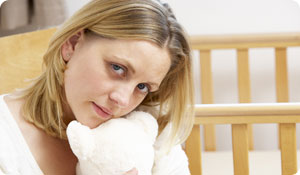
Most first-time moms experience some jitters about holding and caring for their newborn soon after giving birth. And for newbies, the idea of giving the baby a bath for the first time can be downright anxiety-provoking.
But some new mothers actually have vivid, disabling fears that they are going to harm their baby to the point where they may start completely avoiding the baby.
The condition, known as postpartum obsessive compulsive disorder (or postpartum OCD), is characterized by the mother's hypervigilance concerning the issue that she could hurt her baby, according to ABC News. Different from another condition called postpartum psychosis, which is very serious and very rare, postpartum OCD causes a woman to be preoccupied that she will bring harm to her infant.
Its symptoms, unlike those of postpartum psychosis, "may be uncomfortable and even tormenting to a woman, but in postpartum psychosis, a woman will act on those thoughts," Lee Cohen, MD, director of Massachusetts General Hospital's Perinatal and Reproductive Psychiatry clinical Research Program, told ABC News.
With postpartum OCD, women worry that because they have thoughts of hurting their baby, that means that they are more likely to actually act on those thoughts, says Allen H. Weg, EdD, a psychologist with a company called Stress & Anxiety Services of NJ in East Brunswick, NJ. But with postpartum OCD, this is completely untrue, he adds.
"There are many kinds of OCD," he explains. "Some involve repeating behaviors, others involve checking behaviors, where you may repeatedly check that a door is locked. With postpartum OCD, there is a fear of loss of impulse control."
A woman with postpartum OCD, Weg says, may think, "If I am thinking of doing this, could I actually do it? How can I be sure that I won't do this?"
Experts aren't sure how common it is for a new mom to develop postpartum OCD. Women who had other forms of OCD prior to becoming pregnant tend to be more likely to develop postpartum OCD, he explains.
Fortunately, cognitive behavioral therapy is an effective treatment for postpartum OCD, Weg says. During therapy, treatment focuses on "exposure and response prevention," he says.
The therapist pinpoints exactly what is so scary, then focuses on moving the patient closer and closer to this. "If you think you are going to drop your baby, the treatment would be to first hold the baby over the bed, with your husband standing right beside you," Weg explains. Next, the mother would hold the baby over a carpeted floor, and then a bare floor. "The woman practices and gradually learns to trust herself and realize that just because she is thinking these thoughts does not mean she will act on them," Weg says.
If the symptoms are not responding well to cognitive behavioral therapy, the addition of certain types of medications can sometimes be helpful, Weg says. But, he adds, in most cases, cognitive behavioral therapy helps a woman with postpartum OCD get better. "It is very successful, highly researched, evidence-based therapy," Weg explains.
Allen H. Weg, EdD, reviewed this article.
Sources:
Restivo, Jenette. 23 January 2013. "When worrying about a new baby crosses the mental health line." ABC News.
http://abcnews.go.com/Health/story?id=117022
Maternal OCD
http://www.maternalocd.org/





